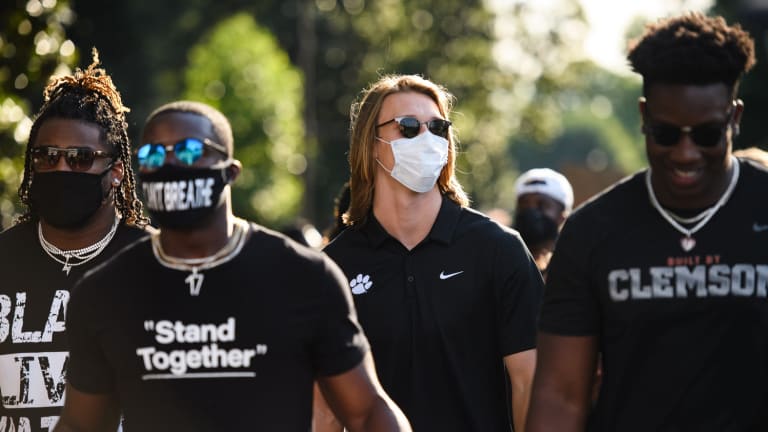
Mr. CFB: Players Have Always Had The Power. Now They Are Figuring Out How To Use It

Many years ago I was sitting in the office of an athletics director who you would know. Somehow the conversation came around to the rights of student-athletes—financial and otherwise.
I asked something like this: “Given the amount of money that is in college athletics, and the money that is on the way, what will happen if someday the players understand exactly how much power they really have? And what if they choose to use it?”
The AD just shook his head.
Better buckle up, sports fans, because we are in the process of finding out what the players will do with power:
**--Oklahoma State running back Chuba Hubbard, the nation’s leading returning rusher, exploded on Twitter because he objected to the fact that his head coach, Mike Gundy, wore the T-shirt of a conservative/right wing news organization during a fishing trip. Hubbard wrote on Twitter: “I will not be doing anything with Oklahoma State until things CHANGE!”
Based on a video released on Tuesday, it appears Gundy and Hubbard have patched things up. But the fact is one of the nation’s most high-profile players, with the support of his teammates, publicly called out his head coach and threatened not to play.
Could Gundy have lost his job over this? Two months ago I would have said no. Given what has happened and the social unrest that exists today, I’m not so sure.
**--At the University of Texas a group of players announced they would not take part in donor events or recruiting events until a list of demands were met. Among the demands was the removal of the school’s popular song “The Eyes of Texas Are Upon You” which the players said had racist undertones. The players also want 0.5 percent of the athletics budget donated to organizations that help African-Americans.
**--At Clemson players led a protest rally on campus that played a role in having the names changed on two campus buildings.
**--Strength Coach Chris Doyle had been with Iowa for 20 years but a number of complaints of unfair treatment about Doyle made by black players in the past two weeks eventually led to a separation agreement between the two parties. Doyle still maintains he did not “cross the line of unethical behavior” when it came to race. But he is gone.
College football players who in the past have been told to stay out of politics because it was bad for the program and bad for the brand, are now on the march and flexing their political muscles. Many coaches, wisely, are marching with them.
Clemson quarterback Trevor Lawrence, the Heisman Trophy favorite for the 2020 season, spoke at the Clemson rally.. Lawrence said what he was doing was “uncomfortable, but necessary.” In the past coaches never would have let their starting quarterback put himself in such a situation. Those days are gone.
And you know what, folks? The players are going to soon be getting two more weapons in their journey towards increased freedom.
The one-time free transfer rule got put on the back burner this year because of all the complications related to the corona virus. It will be passed because the cleanup of the transfer process is long overdue.
Some form of the Name-Image-Likeness legislation will get passed. There is no doubt about that. Earlier this week Florida governor Ron DeSantis pulled a slick move by signing the state’s NIL legislation A FULL YEAR before it goes into effect in 2021. Then the governor “encouraged” the best players in the state to stay at home to play their college football.
So much for not making NIL part of the recruiting process.
But the big fight will be over whether or not the NCAA tries to install “guard rails” to limit how much players will be able to benefit from the new NIL regulations. The NCAA and its member institutions will insist that without such guard rails the NIL will devolve into a Wild, Wild, West of recruiting inducements.
That may well be true. But it’s also not the player’s problem.
The players and their representatives/lawyers will insist that the NCAA does not have the right to restrict what a player can make in the free market because the coaches, athletics directors, college presidents, and conference commissioners do not operate under such restrictions.
The courts will agree, which is why the ultimate goal is for Congress to step in and grant the NCAA an anti-trust exemption.
But here is the bottom line: For the first 150 years of college football, if there was a conflict between the rights of the athlete and the rights of an institution, then the institution would always win. It was for the greater good of competitive balance.
That has changed.
What we’ve seen in the past few weeks is a sea change in the balance of power between the athlete and the university he represents. We’re also seeing a change of the power dynamic between the players and the autocratic head coach.
As we said earlier, when all of this went down, a number of head coaches marched with their players and attended rallies.
That’s the future. That’s the new normal. Coaches who ignore it do so at their own peril.
In the past there have been moments when players exercised power for a short period of time but then the movement ran out of steam. This doesn’t feel like that. This feels like the change is for good.
We’ll see.